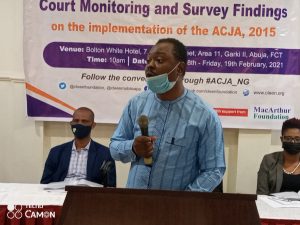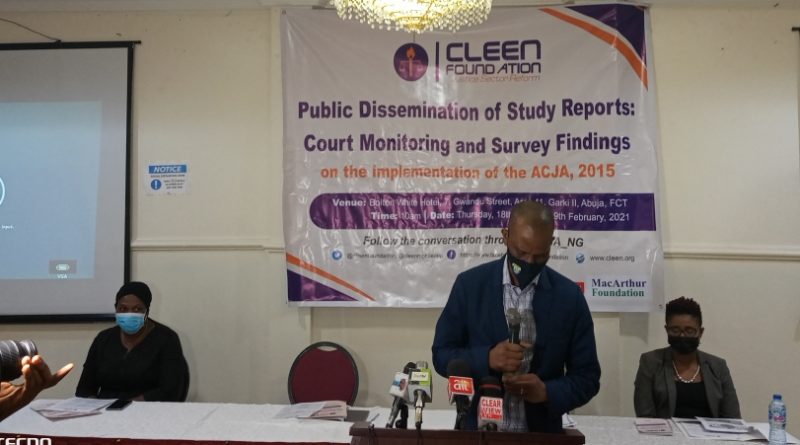JUDGES IN NIGERIA ARE PUNTUAL IN THE COURT- SAYS CLEEN FOUNDATION
Oru Leonard
CLEEN Foundation in a research undertaken in the last one year has said that judges in Nigeria are puntual to Court.
This was made known amidst others by the foundation in a Public Dissemination of Study Reports: Court Monitoring and Survey Findings on the implementation of the ACJA, 2015, held yesterday at Abuja.
CLEEN Foundation at the Public Dissemination Of Findings on Court Monitoring And Compliance With the Implementation Of ACJA 2015 held On
the 18th Feb. 2021, the Executive Director, Benson Olugbuo, Ph.D. in a welcome address applauded MacArthur Foundation for generously supporting innovations and initiatives on criminal justice reform and particularly for immense support on the projects undertaken by CLEEN to monitor the court proceedings on her Corruption cases in relation to the ACJA, 2015.

In a brief background of the foundation, Benson said, the CLEEN Foundation is a non-governmental Organisation established in 1998 with the mission of promoting public safety, security, and accessible justice through the strategies of empirical research, Legislative advocacy, demonstration programmes and publications, in partnership with Government, Civil Society and the Private Sector. He further said that the aims and objectives of the research and it’s public dissemination.
He noted that the reports are outcomes of major researches conducted under two ACJA flagship projects implemented by CLEEN. “The first which is focused on: “Promoting Accountability and Transparency in the Administration of Criminal Justice System in Nigeria”.
“The project deployed technology as a tool to realise its goals by way of digitization of court proceedings/ judgments on corruption-related cases to promote accountability and transparency within the judiciary. The project principally monitored cases of corruption and financial crimes in relation to the implementation of the provisions of the ACJA 2015 through a web-based platform (www.cleen.uwazi.io) Uwazi doc, which is functional, well resourced, accessible and within the reach of the public”


The CLEEN Execuitive Director stated that there are inherent challenges despite provision of the Act, adding that loafty expectations which heralded the passage of the Administration of Criminal Justice Act (2015) six years ago, remains largely unmet, as the anticipated reforms in the efficiency, effectiveness and transparency of the criminal justice system is yet to be fully actualized despite the efforts of the current government to fight against public corruption within and outside the justice sector.
“CLEEN Foundation as a member of the Administration of Criminal Justice Monitoring Commiittee has been committed to contributing to promoting/strengthening of accountability and transparency within the judicial sector since 2016 by partnering with criminal justice reformers and the Judiciary to enlighten citizens on laws and to get citizens involved in the monitoring process and advocacy efforts aimed at ensuring the full implementation of the Law. The Court Monitoring for this project was undertaken by 16 court observers trained and deployed to eight states to assess the court processes as it regards compliance of courts and litigants to the ACJA, 2015 and the ACJLs of the focal states”, Benson expressed.
In the report, Cleen foundation found out that no digitalization of court procession in Nigeria (No use of ICT), as such harps on the court’s inability to deliver timely. The Federal High Court has an increased level of efficiency, more than sixty (60%) of courts in Nigeria dont have websites, the few that do, don’t update the sites. There is a problem in accessing court documents, Judges in Nigeria are punctual to court amidst others.
According to Benson, “The findings and recommendations contained in the report will enable policy makers, civil society organisations, development practitioners and judicial actors to have an evidence-backed resource for upscaling necessary interventions poised at increasing the implementation of the Administration of Criminal Justice laws and to fast track judicial reforms already underway in the respective states. It is our hope that the sub-national governments/judiciaries and critical actors within the states will consider the recommendations of this study reports and initiate or conclude corresponding programmes aimed at achieving the full implementation of the act / state laws and particularly to strengthen the Monitoring Committees formed at the states to ensure continuous accountability and transparency in the administration of criminal justice in Nigeria”.
The Secretary, Administration of Criminal Justice Monitoring Committee, Suloymam Dawodu, in a statement at the event lauded the Cleen Foundation and it’s sponsor, Mac Aurthur Foundation for seeing reasons why the project is a most to embark on.
However, he called for synergy of purpose between the stakeholders and policy makers and also the implementing bodies to be involved in the monitoring as to attain the purpose for the Act.
Mr Daniel Idoko who represented the National Human Rights Commission urged stakeholders to with the NHRC. “Any system that is not monitored does not work”, he posited
Also, speaking at the event, Anna White, the Communication Officer, Cleen Foundation, she pointed out that the challenges in the implementation of the ACJA, 2015 is the absence of monitoring committees, inadequate domestication of the Act and implementation.
However, she called on stakeholders to be fully involved in monitoring and ensure a high rate of activism.

Among the participants who came from different parts of the country include, Barr Ayoami Richards, Alh Yussuf of the Child Development and Concern (CDCF).




